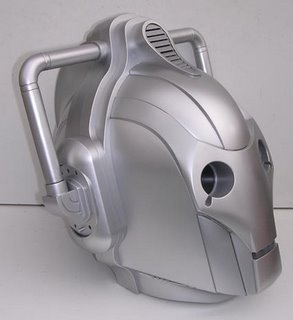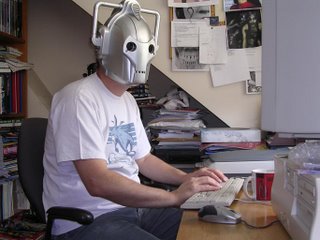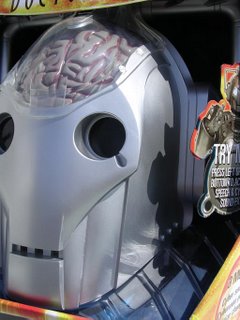Several people asked if I was going to attempt some sort of summation at the end of the season of
Who and this was always my intention ... however looking back over the episodes, it's hard to really put my finger on what really went right or wrong.
The season as a whole was very enjoyable. Every episode had something going for it and none were as bad, or forgettable (which is an even greater sin than 'bad') as some of the ones from last year. Whenever I have to try and list the 13 episodes from 2005 I usually miss a couple - like
The Long Game or
Boom Town, simply because they lacked that memorable factor. And I think a similar thing happens this year. This is the problem of having such a strong arc, or story thread, running through some of the stories, that you tend to forget the individual stories and concentrate instead on the arc. As another example of this, if you ever watched
Babylon 5, then it's hard to recall individual stories. Characters and themes, yes, but what were the *plots* about... and I think
Who is suffering from this.
Consider the two-part Cyberman story in the middle of the season (
Age of Steel/
Rise of the Cybermen), and the two-part conclusion (
Army of Ghosts/
Doomsday). There's not much to tell them apart really. Both have Cybermen in, and battles, and a group of kids fighting the monsters, and Pete and Jackie ... the overall plots merge into one.
Another aspect of the new series of
Who was crystallised for me while I was speaking to my good friend and fellow researcher and writer about
Doctor Who, Andrew Pixley. Andrew perceptively put his finger on the difference between 'Classic' and 'New'
Who. Classic
Who was all about the plots. It was a narrative driven series where the plot was the point. New
Who is all about the emotion. It is the emotional development of the characters which drives the show, and not what happens. Because of this, whereas in the old series it was perfectly acceptable, for example, to spend 10 minutes in the company of Tobias Vaughn and his associate Packer, and to understand them as characters and people because this was important to the plot. However as the New series is all about the Doctor and Rose and their relationship, then you cannot spend much time at all away from them. I wonder if anyone has added up how much time on screen, in each episode,
does not feature either the Doctor or Rose. I suspect it would not be very much at all.
This of course has the effect of making every other character just a cipher, a part of the scenery through which the Doctor and Rose moves. The death of the CyberController in
The Tomb of the Cybermen was exciting and moving as we had spent some time with the creature, and it's battles for life were interesting and gave us perhaps a better insight into Cyber-culture. However Lumic's death was emotionless as we didn't really care much for Lumic or the CyberController he became. We hadn't spent enough time with him to see him as anything other than a Davros-like raving loony, but without the emotional drive which Michael Wisher invested Davros with in his debut, or the character development that he enjoyed in the scripts for
Genesis of the Daleks.
The other thing which changes with the shift from narrative to emotion, is that emotion can only really be done once. As soon as you know the outcome - which is for the most part, the whole
raison d'etre for the episode - then it has less and less impact each time you see it. And in fact, there is little point in re-watching as you know what happens and where it ends up. Someone commented to me that with Classic
Who they can watch it over and over again and love it every time. However with New
Who they have no urge to watch it past about two times. I think this is part of the problem. Why do people go back and read favourite novels or stories over and over. It's because the narrative drive is there, and even if you know the plot, you can still enjoy the journey. But with an emotionally driven story ... well who wants to knowingly put themselves through an emotional wringer time and time again? Even if, as I say, the emotional impact lessens each time.
Another aspect as to perhaps why the series is being mumbled about in some quarters as not being as good as last year is in the attitude of the production team. Last year they had to try really hard. Everyone did, from BBC Worldwide, to the editors, designers, writers and actors, everyone had to give their all to make the series a success. And they succeeded. So for 2006, there's a sense of not trying. The BBC didn't trail it as much. There weren't as many interviews in the lead up, the hoardings around the country weren't there, and there was a general sense of saving a bit of money.
But more importantly is the overall feel of the episodes. Consider this:
This is the pre-season trailer for the 2005 series of
Who. It's dangerous and exciting. It's edited like nothing we've seen, and it really draws you in and makes you want to watch this series.
Now think about the 2006 series. Does that 2005 trailer, the way it's presented, written, edited ... does that bear much resemblance to the episodes in 2006? I don't think it does. It's certainly closer in theme to the 2005 series - consider the episode
Rose and the editing of that: fast and furious and in keeping with this 'style' of storytelling. But the 2006 episodes just seem so safe. They are bog standard television drama. Yes, there are some great effects, but nothing inspired. Nothing to make your jaw drop open and go 'Wow!' in disbelief.
Here's the first public trailer for the 2006 series.
For me the 2005 trailer works. The 2006 one seems very forced. Like they were trying too hard.
The problem with upping your game is that you need to keep it up. Although the scripts were excellent for the 2006 series (for the most part - several could have done with a little more work to iron out logic glitches and so on) the production itself seemed to be on autopilot.
With Rose now gone (although I suspect she will be back at some point) and a new companion coming on board, I really hope that Russell T Davies has got the emotional narrative out of his system now. To have the Doctor and Martha embark on a similar emotional journey would be a big mistake. So hopefully we can instead concentrate on a narrative journey, and enjoy alien planets galore, intelligent, articulate alien monsters, and races of creatures which are not wholly CGI created.
RTD is a brilliant writer, great at character and dialogue. So let's see that genius mixed with some cracking plots, twists and turns, characters you can relate to, can remember, and can feel for when they die (remember poor Vince from
Horror of Fang Rock, Scarman from
Pyramids of Mars, Waterfield and Maxtible from
The Evil of the Daleks, Noah from
The Ark in Space or even minor characters like Binro the Heretic from
The Ribos Operation or Sezom from
The Horns of Nimon).
As a bit of fun, here's my prediction for next year:
Episode 1 - the Doctor meets Martha
Episode 2 - a story set in the future where the Face of Boe turns up again and utters something meaningful before vanishing
Episode 3 - an original historical story by Mark Gatiss
Episode 4/5 - a two parter featuring an old monster
Episode 6 - a story focussing on Martha
Episode 7 - a story with a guest star, probably written by Stephen Moffatt. And a CGI monster. And a reference to bananas.
Episode 8/9 - another two parter, probably with someone returning from earlier in the season
Episode 10 - an experimental story
Episode 11 - something about a small victory, nothing universe-shattering
Episode 12/13 - the monster from episodes 4/5 returns, and in episode 13 another old monster re-appears, probably the Daleks or Cybermen. Martha is written out if her contract expires, or someone close to her and the Doctor suffers a shattering loss.
What do you think? Maybe I have one or two of the details wrong but the overall thrust seems to be in line with what we have seen so far.
Whatever, I'm looking forward to
The Christmas Invasion and to next year's offering with anticipation.
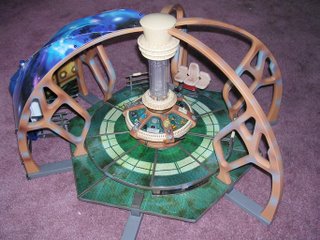 I promised myself ages ago that I would try and post some reviews and comments about some of the new merchandise that's been coming out. You can see my comments on the Voice Changer Helmet below, but here's something on another of the best toys ever to be produced for Doctor Who, the TARDIS Playset and associated figures.
When I was a kid, I would have died and gone to heaven if there had been a TARDIS playset of the quality and complexity of the new toy from Character Options. When the Dapol one came out, it was so cheap and plastiky, and of course the TARDIS console only had five sides ... but at least it was a TARDIS console. Now, with the new series, we have the large and organic looking affair, with the console resting in the middle. On the TV it's a work of art, and the toy manages to capture much of the same feeling.
I promised myself ages ago that I would try and post some reviews and comments about some of the new merchandise that's been coming out. You can see my comments on the Voice Changer Helmet below, but here's something on another of the best toys ever to be produced for Doctor Who, the TARDIS Playset and associated figures.
When I was a kid, I would have died and gone to heaven if there had been a TARDIS playset of the quality and complexity of the new toy from Character Options. When the Dapol one came out, it was so cheap and plastiky, and of course the TARDIS console only had five sides ... but at least it was a TARDIS console. Now, with the new series, we have the large and organic looking affair, with the console resting in the middle. On the TV it's a work of art, and the toy manages to capture much of the same feeling.
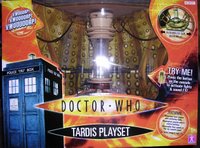 The box it comes in is large and heavy, and immediately you start to wonder at the engineers who work out how to pack everything. This toy is an incredible array of pieces, all held in the box with sticky tape and little twisted wires. It took me at least half an hour just to unpack all the pieces, and then another half hour to assemble it. But it's worth every minute.
The attention to detail is spectacular, from the console itself to the struts, the removable floor panels, the entranceway - there's even a hat stand and a little set of hammers! When the console is switched on, you get all the TARDIS sounds, from take off to in flight to various bleeps and whooshes as the different and well disguised buttons on the console are pressed. There's a hatch on the console which opens for repairs to be carried out (or for Rose to get another dose of Vortex Power). The column also glows a superb green, and when the clear perspex tubes start moving and meshing together as the ship takes off, it truly is a thing of great beauty.
But what use is a Playset without some players, and Character Options have a great, if a little limited so far, range of characters to journey in the TARDIS. Of course there is the Doctor, and there's a few to choose from:
The box it comes in is large and heavy, and immediately you start to wonder at the engineers who work out how to pack everything. This toy is an incredible array of pieces, all held in the box with sticky tape and little twisted wires. It took me at least half an hour just to unpack all the pieces, and then another half hour to assemble it. But it's worth every minute.
The attention to detail is spectacular, from the console itself to the struts, the removable floor panels, the entranceway - there's even a hat stand and a little set of hammers! When the console is switched on, you get all the TARDIS sounds, from take off to in flight to various bleeps and whooshes as the different and well disguised buttons on the console are pressed. There's a hatch on the console which opens for repairs to be carried out (or for Rose to get another dose of Vortex Power). The column also glows a superb green, and when the clear perspex tubes start moving and meshing together as the ship takes off, it truly is a thing of great beauty.
But what use is a Playset without some players, and Character Options have a great, if a little limited so far, range of characters to journey in the TARDIS. Of course there is the Doctor, and there's a few to choose from:  you can have the original Eccleston model or the Tennant version in Eccleston's outfit (these are both in a 'Regeneration' pack which was exclusive to Argos but which can now be found in some specialist shops), or there's a Tennant in his long brown coat, or Tennant in his Austin Powers-esque suit. Some of these come with a mini-sonic screwdriver as well, so the Doctor can be armed against the forces of evil. By his side there is Rose Tyler. Unfortunately, at the moment there's only one version of Rose available, and she doesn't have full articulation and so looks like she's spoiling for a fight all the time. Later in the year, there's another Rose figure coming in a different outfit and which does have full articulation.
Along with the Rose figure currently available, you get a K9 as well. This is a lovely little toy, well made and beautiful. If you'd prefer a small radio control version to zip about the TARDIS with, then that's available as well along with a Doctor figure (the same suited version as is available separately).
On the baddies front, there's the masked Sycorax Leader, complete with staff and whip, and also Lady Cassandra (the flat skin woman) who comes on her own or with Chip her servant (who is lacking articulation in his elbows making him seem a little like a zombie some of the time). There's also a little blue fellah on a travel disk thing. He's the Moxx of Balhoon and only appeared briefly in the series. There's also a Slitheen figure with a lovely snarling mouth and big arms and claws.
you can have the original Eccleston model or the Tennant version in Eccleston's outfit (these are both in a 'Regeneration' pack which was exclusive to Argos but which can now be found in some specialist shops), or there's a Tennant in his long brown coat, or Tennant in his Austin Powers-esque suit. Some of these come with a mini-sonic screwdriver as well, so the Doctor can be armed against the forces of evil. By his side there is Rose Tyler. Unfortunately, at the moment there's only one version of Rose available, and she doesn't have full articulation and so looks like she's spoiling for a fight all the time. Later in the year, there's another Rose figure coming in a different outfit and which does have full articulation.
Along with the Rose figure currently available, you get a K9 as well. This is a lovely little toy, well made and beautiful. If you'd prefer a small radio control version to zip about the TARDIS with, then that's available as well along with a Doctor figure (the same suited version as is available separately).
On the baddies front, there's the masked Sycorax Leader, complete with staff and whip, and also Lady Cassandra (the flat skin woman) who comes on her own or with Chip her servant (who is lacking articulation in his elbows making him seem a little like a zombie some of the time). There's also a little blue fellah on a travel disk thing. He's the Moxx of Balhoon and only appeared briefly in the series. There's also a Slitheen figure with a lovely snarling mouth and big arms and claws.
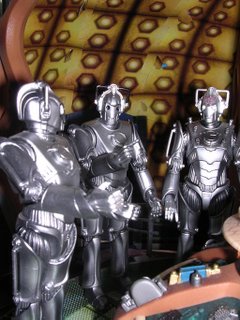 But by far the best of the figures is the Cyberman. This is a total work of art. The figure is articulated in all the right places, can be posed in many ways (though he can't sit down) and you just want to get loads of them to create your very own Cyber-Army. Every army needs commanders, and from Toys R Us, you can get a brilliant Cyber-Controller (with brain revealed) in the same scale. Also, coming soon from Argos, is a Cyber-Playset in which you'll find a Cyber-Leader (same as a Cyberman but with black 'ear' handles). So we can start to form whole batallions of Cybermen :)
But by far the best of the figures is the Cyberman. This is a total work of art. The figure is articulated in all the right places, can be posed in many ways (though he can't sit down) and you just want to get loads of them to create your very own Cyber-Army. Every army needs commanders, and from Toys R Us, you can get a brilliant Cyber-Controller (with brain revealed) in the same scale. Also, coming soon from Argos, is a Cyber-Playset in which you'll find a Cyber-Leader (same as a Cyberman but with black 'ear' handles). So we can start to form whole batallions of Cybermen :)
 Of course there's the Daleks as well, and these are only available as the remote control variety in black and gold - even so, having a Dalek vs K9 remote control battle on the kitchen floor is enormous fun. There is a non-remote controlled black Dalek available in a £30 gift set from Woolworths, along with five other figures from the range, so if you don't have them as yet, and are looking for an 'all in one go' option, then this would be ideal.
Of course there's the Daleks as well, and these are only available as the remote control variety in black and gold - even so, having a Dalek vs K9 remote control battle on the kitchen floor is enormous fun. There is a non-remote controlled black Dalek available in a £30 gift set from Woolworths, along with five other figures from the range, so if you don't have them as yet, and are looking for an 'all in one go' option, then this would be ideal.
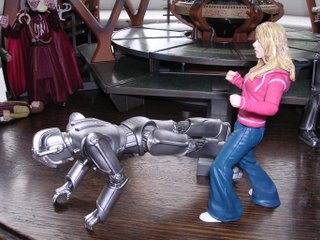 The problem of course, comes when you introduce the figures to the playset ... in my case, the Doctor immediately started trying to make repairs and take off, while the Cybermen tried to talk him out of it as they wanted to go to a club. Meanwhile Rose and another Cyberman tried to prove who was the fittest by exercising. Rose jogged on the spot while the Cyberman did push-ups.
Meanwhile, the Cybermen discussed the situation with the Cyber-Controller and eventually the Doctor and Rose left them to it and went off in the TARDIS on their own.
Other things I've seen happening on my front room table: Rose whipping the Cybermen into submission with the Sycorax's whip; the Doctor sitting on the back of K9 and riding around the console room; Cassandra and the Moxx deep in conversation about the relative values of saliva as a form of gift; and of course the Dalek trying to get through the TARDIS Police Box doors - for some reason the 'elevate' function is missing from the remote control.
Overall, these are magnificent toys. They're well priced at £6.99 each for the standard figures, while the TARDIS Playset is £39.99 (which seems to be something of a bargain given all the work which has obviously gone into it).
If you're still not convinced, then check out the television advert for the range. Here's a link so you can see for yourself.
The problem of course, comes when you introduce the figures to the playset ... in my case, the Doctor immediately started trying to make repairs and take off, while the Cybermen tried to talk him out of it as they wanted to go to a club. Meanwhile Rose and another Cyberman tried to prove who was the fittest by exercising. Rose jogged on the spot while the Cyberman did push-ups.
Meanwhile, the Cybermen discussed the situation with the Cyber-Controller and eventually the Doctor and Rose left them to it and went off in the TARDIS on their own.
Other things I've seen happening on my front room table: Rose whipping the Cybermen into submission with the Sycorax's whip; the Doctor sitting on the back of K9 and riding around the console room; Cassandra and the Moxx deep in conversation about the relative values of saliva as a form of gift; and of course the Dalek trying to get through the TARDIS Police Box doors - for some reason the 'elevate' function is missing from the remote control.
Overall, these are magnificent toys. They're well priced at £6.99 each for the standard figures, while the TARDIS Playset is £39.99 (which seems to be something of a bargain given all the work which has obviously gone into it).
If you're still not convinced, then check out the television advert for the range. Here's a link so you can see for yourself.

